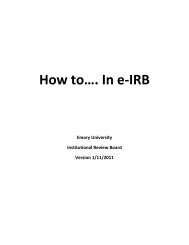A Manual for Participants in Clinical Trials of Investigational Agents ...
A Manual for Participants in Clinical Trials of Investigational Agents ...
A Manual for Participants in Clinical Trials of Investigational Agents ...
You also want an ePaper? Increase the reach of your titles
YUMPU automatically turns print PDFs into web optimized ePapers that Google loves.
4.2.2 Other Phase 1 Investigators<br />
Qualified <strong>in</strong>vestigators with peer-reviewed expertise <strong>in</strong> the conduct <strong>of</strong> early cl<strong>in</strong>ical trials<br />
are also eligible to conduct unsolicited phase 1 trials. Investigators are usually selected<br />
because <strong>of</strong> unique expertise or research experience relevant to the agent or the<br />
availability <strong>of</strong> certa<strong>in</strong> patient populations or laboratory facilities to per<strong>for</strong>m special<br />
studies. These cl<strong>in</strong>ical studies are usually per<strong>for</strong>med as <strong>in</strong>vestigator-<strong>in</strong>itiated research<br />
us<strong>in</strong>g the R21, R01 or P50 grant fund<strong>in</strong>g mechanisms. Grants can be submitted as<br />
<strong>in</strong>vestigator <strong>in</strong>itiated research applications or <strong>in</strong> response to a Program Announcement<br />
(PA) or Fund<strong>in</strong>g Opportunity Announcement (FOA). These opportunities may be found<br />
at either http://grants.nih.gov/grants/guide/<strong>in</strong>dex.html or<br />
http://www.grants.gov/applicants/f<strong>in</strong>d_grant_opportunities.jsp.<br />
In all cases, such <strong>in</strong>vestigators must have demonstrated competence <strong>in</strong> conduct<strong>in</strong>g<br />
phase 1 studies with anticancer agents. Ad hoc phase 1 <strong>in</strong>vestigators must fulfill all<br />
CTEP requirements <strong>for</strong> trial conduct, as def<strong>in</strong>ed <strong>in</strong> this section, and <strong>for</strong> report<strong>in</strong>g <strong>of</strong> data<br />
as described <strong>in</strong> Section 10.<br />
4.3 Which Organizations Can Conduct Phase 1 Studies<br />
Phase 1 trials are most commonly conducted by s<strong>in</strong>gle <strong>in</strong>stitutions. Multicenter trials with<br />
a new s<strong>in</strong>gle agent hav<strong>in</strong>g an unknown adverse event pr<strong>of</strong>ile are usually conducted most<br />
safely <strong>in</strong> a s<strong>in</strong>gle center. In unique situations, phase 1 trials may require multiple<br />
<strong>in</strong>stitutions, such as with many pediatric phase 1 studies (see Appendix III), and with<br />
agents that are targeted specifically <strong>for</strong> a s<strong>in</strong>gle disease or limited subpopulation <strong>of</strong><br />
cancer patients.<br />
4.4 Who Is Eligible to Adm<strong>in</strong>ister Phase 1 <strong>Agents</strong><br />
All phase 1 agents must be adm<strong>in</strong>istered only at <strong>in</strong>stitutions listed on the approved<br />
protocol’s cover page and must be adm<strong>in</strong>istered under the protocol chair’s supervision.<br />
Investigators must not send these agents to referr<strong>in</strong>g physicians, except with CTEP’s<br />
written permission. The protocol must describe any part <strong>of</strong> the treatment that will be<br />
adm<strong>in</strong>istered at a site other than the study center <strong>in</strong> detail.<br />
4.5 How to Obta<strong>in</strong> In<strong>for</strong>mation about Phase 1 <strong>Agents</strong><br />
4.5.1 Investigator’s Brochure<br />
This document conta<strong>in</strong>s all relevant <strong>in</strong><strong>for</strong>mation about the agent, <strong>in</strong>clud<strong>in</strong>g animal<br />
screen<strong>in</strong>g, precl<strong>in</strong>ical toxicology, detailed pharmaceutical data, pharmacology and<br />
mechanism <strong>of</strong> action. The brochure also conta<strong>in</strong>s <strong>in</strong><strong>for</strong>mation about the cl<strong>in</strong>ical adverse<br />
events observed <strong>in</strong> cl<strong>in</strong>ical trials. CTEP has an Investigator’s Brochure <strong>for</strong> each<br />
<strong>in</strong>vestigational agent it sponsors. CTEP provides these rout<strong>in</strong>ely to <strong>in</strong>vestigators who<br />
are approved to conduct a cl<strong>in</strong>ical trial <strong>of</strong> the agent at the time the LOI is approved, and<br />
when the Investigator’s Brochure is updated. When necessary, <strong>in</strong>vestigators with<br />
approved LOIs or protocols may obta<strong>in</strong> the Investigator’s Brochure from the<br />
Pharmaceutical Management Branch (ibcoord<strong>in</strong>ator@mail.nih.gov).<br />
4.5.2 <strong>Investigational</strong> Drug Branch (IDB) Physicians<br />
Each CTEP <strong>in</strong>vestigational agent is assigned to an IDB staff physician, who prepares the<br />
solicitation <strong>for</strong> <strong>in</strong>itial cl<strong>in</strong>ical trials and coord<strong>in</strong>ates its cl<strong>in</strong>ical development under DCTD<br />
sponsorship. Phase 1 <strong>in</strong>vestigators are advised to discuss a proposal with this physician<br />
Section 4 - Investigator’s <strong>Manual</strong> 2009 16




